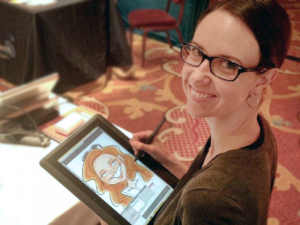 Imagine transitioning from making $8.50 per hour and sharing a crammed apartment with 5 people, to being a six-figure business owner doing what you love.
Imagine transitioning from making $8.50 per hour and sharing a crammed apartment with 5 people, to being a six-figure business owner doing what you love.
That’s the journey that Julia Kelly, caricature artist and founder of JK Expressions, took.
Sounds great, right?
Well, as they say, more money = more problems.
When Julia earned $25,000 – $30,000 per year, she had fantastic money management skills. She had no debt and plenty of savings.
But when her business started making six figures, she began ignoring her finances, stopped saving money …. and racked up thousands in personal credit card debt.
Why?
Some of us write this off as life getting more expensive as we get older, but it’s actually a classic case of lifestyle inflation — when you make more, you spend more.
Why is it a problem? Because when you spend more and neglect savings, your net worth doesn’t increase, even though you’re earning more.
After Julia began earning six figures, she decided she was no longer happy with $12 haircuts from Supercuts. She happily splurged for $75 salon style cuts instead.
She started paying for convenience. One-click Amazon order? Check. Ordering an Uber or Lyft so she didn’t have to deal with parking at the airport? Check. Eating out? Check.
She became lazy about saving money, assuming that she could always earn more. Money was coming into her bank accounts at an unprecedented pace – so her finances would take care of themselves, right?
Wrong.
As Julia discovered, when you “upgrade” certain aspects of your life, you may find it difficult to downgrade. You keep spending more and more, trapped on a consumer treadmill. You’re forced to work to fuel your spending addiction.
Left unchecked, this saps every ounce of freedom from your life.
Ouch.
In this episode, you’ll learn:
- Why you shouldn’t take lifestyle inflation lightly
- How to stop lifestyle inflation before it happens
- What Julia regrets buying … and what she doesn’t
- The easiest, most effective antidote to lifestyle inflation
- How Julia differentiates between saving time vs. wasteful convenience spending
- What Julia’s advice is to those who are working on increasing their income, but don’t want to succumb to lifestyle inflation
— Paula
Resources Mentioned:
- Gretchen Rubin’s episode, The Power of Habit Formation
- Julia’s story on the Afford Anything blog
- Cal Newport’s episode, The Incredible Value of Deep Work, Instead of Distraction
- Julia’s site, JKExpressions.com
I also want to take a moment to thank the sponsor for this episode.
If you’ve been listening for a while, you’ve heard me interview many best-selling authors. Before I interview these guests, I need to read or refresh my memory of their books.
Sitting down to physically read the books can take a long time. That’s why I listen to their audiobooks, thanks to my subscription to an audiobook service called Audible. If you want to give them a try for free, head to audible.com/trynow for a free 30-day trial.